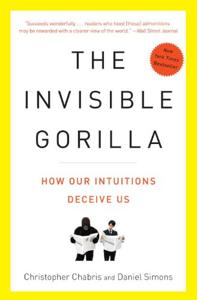
Want to learn the ideas in The Invisible Gorilla better than ever? Read the world’s #1 book summary of The Invisible Gorilla by Christopher Chabris, Daniel Simons here.
Read a brief 1-Page Summary or watch video summaries curated by our expert team. Note: this book guide is not affiliated with or endorsed by the publisher or author, and we always encourage you to purchase and read the full book.
Video Summaries of The Invisible Gorilla
We’ve scoured the Internet for the very best videos on The Invisible Gorilla, from high-quality videos summaries to interviews or commentary by Christopher Chabris, Daniel Simons.
1-Page Summary of The Invisible Gorilla
Overview
Most people consider themselves to be smart, attentive and rational. However, they often overestimate their brain’s capacities. Many self-help books tell us that we should use our gut feelings and follow our intuition in order to make good decisions in life. In this article you’ll learn why these are bad ideas, as well as how you can’t even count on your intuition at all—you can’t even spot a gorilla walking across the room!
In this passage, you’ll learn how a police officer could miss a brutal attack happening right next to him. You’ll also learn how it’s possible to create false memories about sitting next to Jean-Luc Picard from Star Trek. Also, you will discover what high ice cream sales have to do with high drowning rates.
The TED Talk by Dan Ariely, which inspired these key points, was one of the most popular talks on TED in 2012 and has been viewed over 2 million times online.
Big Idea #1: Though we’re taught otherwise, our intuition often can’t be trusted.
We all have times when we think that our intuition will guide us through a situation, but then it leads to more problems. It’s easy to get caught up in this kind of thinking because sometimes your gut feeling can lead you astray. Here are some reasons why.
We’re often told that we should trust our gut, but it’s not always the best way to make decisions. Sometimes our intuition is not based on common sense and can lead us astray.
In recent years, self-help books have lauded decisions based on intuition over those made with analysis. Malcolm Gladwell’s Blink – The Power of Thinking without Thinking demonstrates this by revealing how a Greek statue appeared on the art market and was subsequently proclaimed to be a fake by art experts who trusted their gut. In contrast, several analyses weren’t able to show it was fake.
However, intuition can be wrong. Experts are sometimes fooled by forgeries.
For instance, a book dealer found and sold several manuscripts for unknown books by well-known writers. Librarians thought they were real; however, after close analysis, the books turned out to be fake. It’s also important to remember that we have phrases in our language that tell us of the limitations of our intuition. For example, many say “never judge a book by its cover” because we know we can’t reliably assess something at first glance.
Big Idea #2: We believe we see more than we do, and that we’re more attentive than we actually are.
If someone was getting beaten up on the street, we would notice and intervene. However, if we’re focused intently on something else, like a speech or an important task at work, we can miss even obvious things that are happening in front of us.
The authors of the study designed an experiment to see how people can miss obvious things. In their experiment, they had participants count the number of passes made by one team in a basketball game. However, something rather odd happened: A gorilla walked onto the court, beat his chest for nine seconds and left. Surely everyone would notice that! Actually, no. Half of those who were tested didn’t even see the gorilla because they were focused on counting passes instead.
It’s not surprising that Kenny Conley, a police officer in Boston, did not see another black officer being beaten up next to the fence he was climbing. His attention was on the pursuit.
But we not only miss things when we’re focused on something else, but also fail to see what we don’t know or are not looking for.





